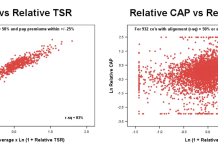The financial case for efficiency, using the example of the UK Government’s VfM policy, is explored by Ray Dorney, Director at Rockford Associates
The UK Government’s Value for Money (VfM) policy is designed to ensure that public funds are used efficiently, effectively, and economically to maximise the benefits to society.
Central to this policy is establishing the Office for Value for Money (OVfM), aimed at reducing waste and maximising outcomes across government programmes. This initiative reflects the UK Government’s broader economic stability, growth, and public accountability agenda.
“I look forward to working within government over the coming year to bring renewed focus to ensuring we deliver maximum value for the public in how money is spent”.
– David Goldstone, Chair, Office for Value for Money
Key principles of the VfM Policy
- Economy: Minimising the cost of resources while maintaining quality.
- Efficiency: Maximising outputs for a given level of inputs.
- Effectiveness: Ensuring that outputs achieve the intended outcomes.
These principles will be achieved by following the steps:
Accountability and transparency
Public officials are accountable for ensuring the prudent use of funds.
Decisions and spending are documented, accessible, and subject to scrutiny.
Outcome-focused spending
Budgets are allocated to achieve measurable, impactful outcomes rather than merely funding activities. Regular evaluations ensure alignment with policy goals.
Risk management
Risks to achieving VfM are identified and mitigated early. Scenarios are analysed to adapt to changes without compromising outcomes.
Engagement with stakeholders
Involvement of communities, private sectors, and non-profits ensures diverse perspectives and innovative solutions.
Sustainability
Investments consider long-term economic, social, and environmental impacts. Projects align with the UK’s Net Zero goals where applicable.
Strategic planning
Government departments develop comprehensive business cases for spending, using tools like the Treasury’s Green Book to appraise and evaluate projects.
Performance metrics
Establishing key performance indicators (KPIs) linked to outcomes. Regular monitoring and reporting ensure resources are directed where they are most effective.
Procurement standards
Ensuring procurement processes are competitive and fair. Contracts include clear deliverables and penalties for non-compliance.
Regular audits
Audits provide independent assessments of whether funds are spent effectively.
Public participation
Mechanisms for citizen feedback ensure that services align with public needs and expectations.
All of which align perfectly with a regular independent Account Payable Audit.
How can an Accounts Payable audit help?
While strategic planning and rigorous financial frameworks underpin the VfM policy, operational processes like Accounts Payable (AP) management often hold the potential for furthering its goals.
Given the scale of government spending, even minor inefficiencies in AP processes can lead to significant financial losses. Exceptions such as duplicate payments, contract non-compliance, or delayed disbursements can erode public
trust and strain budgets.
Conducting a comprehensive AP audit addresses these risks and supports the principles of economy, efficiency, and effectiveness.
1. Improving economy: Reducing costs
Minimising the costs of resources without compromising quality.
Identifying duplicate payments:
Audits uncover instances where invoices are paid multiple times, enabling recovery of funds.
Verifying overpayments:
Errors in data entry or vendor billing can lead to overpayments, which audits help detect and rectify.
Streamlining vendor contracts:
By reviewing compliance with agreed payment terms and pricing structures, audits ensure that government agencies are not overcharged.
2. Enhancing efficiency: Optimising processes
Efficiency focuses on maximising output from available resources. An AP audit helps:
Identifying process bottlenecks: Audits reveal inefficiencies in workflows, such as delays in invoice approvals or manual data entry.
Improving cash flow management: By ensuring timely payments, audits prevent late fees and take advantage of early payment discounts where applicable.
Reducing administrative burden: Detecting and eliminating redundant tasks simplifies operations and reduces staff workload.
Efficient AP processes enable the government to allocate resources more effectively, ensuring smooth service delivery.
3. Ensuring effectiveness:
Achieving desired outcomes
Strengthening compliance: They ensure adherence to procurement regulations, contractual terms, and anti-fraud measures.
Verifying suppliers: Audits identify fraudulent or inactive vendors, safeguarding against improper payments.
Enhancing transparency: By providing a clear record of payments, audits boost accountability and public confidence in government spending.
Benchmarking, findings, and recommendations report: Clear comparison and advice to minimise any future exceptions and improve internal processes.
“The UK Governments Value for Money policy is a critical part of their policy to deliver ongoing benefits to our wider society, as part of our agreement with the Crown Commercial Services, Rockford Associates have delivered more Accounts Payable recoveries than any other supplier. Our new benchmarking and Finding and Recommendations reporting process allows organisations to compare, monitor and improve their performance every year.”
– Ray Dorney, Director, Rockford Associates
And this is where Rockford Associates can help!
Rockford’s Accounts Payable Audit service consists of a review of historic payment transaction data, utilising proprietary in-house forensic software to uncover overpayments resulting from;
- Goods or services being paid for twice.
- Payments being made to the wrong supplier.
- Payments being made in the wrong currency.
- The by-passing of existing software duplicate checks.
- The same invoice being paid across different Accounts Payable systems, divisions or ledgers.
- Credit notes being paid as invoices.
- Cleansing data for potential mergers or acquisitions
To find out more and how Rockford Associates Limited can assist your organisation benefit from a risk-free AP review that requires no budget, yet could deliver substantial returns, please do get in touch; our contact details are below:

This work is licensed under Creative Commons Attribution-NonCommercial-NoDerivatives 4.0 International.











